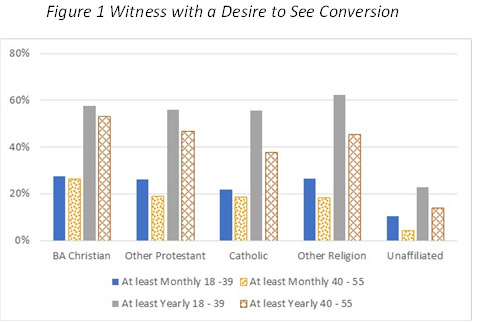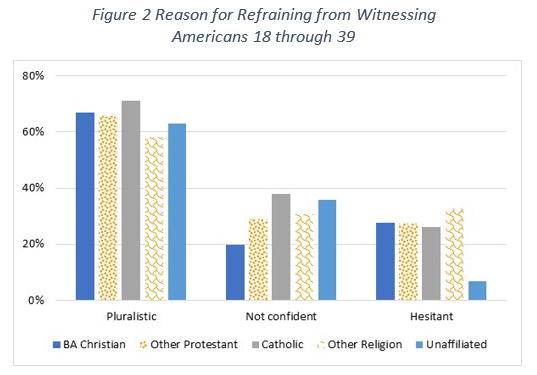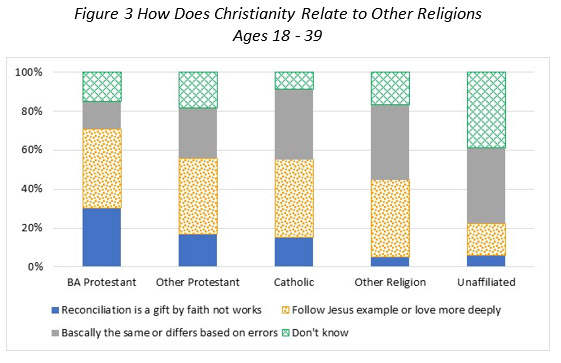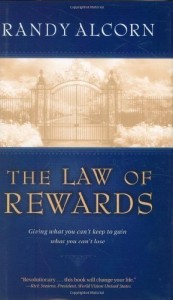Steve Cable continues to explore Probe’s 2020 survey on religious beliefs and practices, examining how people witness to their faith or not, and reasons for both sharing and for not trusting Christ.
1. How Often Do You Witness to Your Faith?
Let’s consider the topic of witnessing or sharing your faith with others. In our 2020 survey we asked two questions about this topic. The first question was: How often do you engage in intentional spiritual conversation with non-believers about your faith with a desire to see them accept it for themselves? With this question, we wanted to avoid casual mentions of your faith and discussions with no intent at conversion. The results as shown in the chart below are surprising.
Among Americans ages 18 through 39 who profess an affiliation with some religion, we find that less than 1 out of 5 (20%) of them strongly disagree with the statement that Muhammad, Buddha and Jesus all taught valid ways to God. Yet at the same time almost 6 out of 10 (60%) of them state that they share their faith with an unbeliever at least once a year with the intent of converting them to their belief.
So the majority of American believers (of any faith) must believe that at least for some people with different religious beliefs, it would be better for them to turn from their current belief and accept the tenets of my faith. They want to do this even though they believe that there are multiple ways to God not beyond just their faith.
 Looking at the detailed results, all religions except the Unaffiliated showed very similar results: over 20% (1 in 5) of those witnessed at least monthly and about half witnessed at least yearly. So, it would appear that there is a lot of witnessing going on with very few conversions.
Looking at the detailed results, all religions except the Unaffiliated showed very similar results: over 20% (1 in 5) of those witnessed at least monthly and about half witnessed at least yearly. So, it would appear that there is a lot of witnessing going on with very few conversions.
Table 1 below shows several estimates as to how many people are the recipients of these “intentional spiritual conversations” in a given year. The different levels shown are based on different assumptions as to how often they share with the same person and how many people they share with in a year consistent with the responses to the survey. More details are provided in the endnotes.
Table 1 Potential
Number of People Shared with by American Adults Ages 18 through 55
|
Religious |
Potential number of individuals shared with in one year |
||
|
Low estimate (millions){1} |
Nominal estimate (millions){2} |
High estimate (millions){3} |
|
|
Born Again Protestant |
27 |
56 |
118 |
|
Other |
24 |
50 |
106 |
|
Catholic |
25 |
51 |
108 |
|
Other |
15 |
31 |
65 |
|
Unaffiliated |
12 |
25 |
52 |
|
Total |
103 |
212 |
449 |
These results amazed me. If the nominal estimate was truly happening almost 60% of the population would have someone attempting to convert them every year. This topic deserves additional related questions to determine what level of sharing with the intent of conversion is actually happening in America. It may be that most people answering this question are only sharing with one or two family members such as their teenage children or a sibling. Or perhaps, many people think they would do this, but really they do not.
What makes this especially surprising is that Other Protestants and Catholics have a lot more people witnessing than they have holding a Basic Biblical Worldview or actually being involved in their religion. While only about one in ten (10%) strongly disagree with the statement that Mohammed, Buddha and Jesus all taught valid ways to God, over half (50%) of them are sharing their faith with the intent to convert at least once a year. And, one in five (20%) are sharing monthly or more. If you think that there are multiple ways to heaven, why would you want to go out of your way to convert someone to your religion. Of course, you could be sharing with an Unaffiliated person who needs to choose a valid religion.
Only 4.6% of Other Protestants and 0.7% of Catholics have a Basic Biblical Worldview, but almost half of them say they intentionally witness to their faith at least yearly. When they engage in a conversation with the intent of having this other person accept their faith for themselves, WHAT IS THIS FAITH THEY ARE TRYING TO GET THE OTHER PERSON TO ACCEPT? These results do suggest that most people desire more people to think like them when it comes to religion.
In a similar vein, less than 1 in 10 (10%) Catholics and Other Protestants say they pray daily, attend church at least monthly, read the Bible weekly and say their faith is important in their daily life. So, the question remains, “What are they witnessing to???”
In contrast, only 29% of Born Again Christians have a Basic Biblical Worldview while well over half of them report intentional witnessing at least once a year. But at least BAC’s have something to witness to. Those Born Again Christians with a Basic Biblical Worldview report that almost two thirds (63%) of them share their faith at least once a year. This level is only a few percentage points higher than that for Born Again Christians as a whole.
How Should We Respond?
If the number of people sharing their faith is actually consistent with the answers to this question, then we know that the percentage of people actually converting as a result of their witness is very small. Otherwise, we would have many people toggling back and forth between different professed religions.
Among Born Again Christians, we project they are sharing their faith with between 25 million and 100 million nonbelievers. However, they are sharing ineffectively with the number being shared with far exceeding the growth rate of evangelicals in America. So, pastors and parachurch organizations need to up their game in training their people to share the good news of Christ. BAC’s need to understand and practice the following:
1. Bathe their unsaved acquaintances in prayer asking God to bring to a clear feeling of need
2. Recognize their call to effectively share the gospel looking for opportunities to share
3. Understand how to build bridges spanning the gaps of understanding for those with different worldviews
4. Clearly explain the wonderful gift purchased for us through Jesus’ death and resurrection
5. Unapologetically ask for a response to the good news shared with others
6. Realize that they should not be discouraged by a lack of interest of the lack of a positive response
2. What Keeps You From Communicating Your Religious Belief?
 We also asked the question: “When I refrain from communicating my religious belief with someone, it’s usually because:”{4}
We also asked the question: “When I refrain from communicating my religious belief with someone, it’s usually because:”{4}
1. They can get to heaven through their different religious belief. [Pluralism]
2. We shouldn’t impose our ideas on others. [Pluralism]
3. The Bible tells us not to judge others. [Pluralism]
4. It just doesn’t seem to be that important and I don’t want to risk alienating them. [Not confident]
5. I’m not confident enough in what I believe. [Not confident]
6. I’m waiting for a better opportunity. [Hesitant]
For the chart in Figure 2, we grouped these responses into three sets:
• Pluralism – There are other ways besides my way and I don’t need to impose my way on others (responses 1, 2 and 3)
• Not confident – Not confident that what I have to share is important to them and/or not confident that what I believe is true (responses 4 and 5)
• Hesitant – No rush, I can probably find a better time (response 6)
As seen in the chart, the level of respondents selecting each set of reasons for refraining are consistent across all religious beliefs. At first glance, this may seem surprising. But in a culture where pluralism is a dominant part of all religious groups, it begins to make sense. And the pluralistic reasons were dominant, attracting around two thirds of the population across all religious groupings.
For Born Again Christians, lack of confidence in what they believe is less of an issue than for other groups. And we see that the Unaffiliated are much less likely to be hesitant waiting for a better time at around 5% of all Unaffiliated. But note that most of the other groups had less than 25% say that they were hesitant.
Looking at both of the charts, we see that (even with a lot of people saying they sometimes used excuses to avoid the subject) a majority of people of any religious group (not including the unaffiliated) share with someone with a desire to recruit them at least once a year. I would suspect that most of these people are sharing with a family member or close friend. However, we did not ask the question so that is only reasonable speculation.
How Should We Respond?
If you are a church leader or a person who desires to see Christians sharing the good news of Jesus with those who need to know, how should you respond to this data on self-identified barriers to sharing with others?
On the most common reasons (which indicate a belief that other people don’t really need to know about salvation through faith in Jesus), we need to make the exclusive role of Jesus Christ in any hope of salvation a recurring and prominent theme in our teaching. This is not a topic to tiptoe gingerly around. Rather, we need to boldly proclaim, “There is salvation in no other name under heaven other than the name of Jesus Christ.” God would not have planned from before the beginning of time to sacrifice himself on the cross for our salvation if there were any other means to reconcile sinful men and women to Himself. God will not force reconciliation on us. We can choose to reject His grace. But as Paul tells us in Romans, “How are they to believe in one they have not heard of?” If we think we can slough off our responsibility to tell others, we do not understand the grace of God and our role as citizens of heaven living on this earth.
For those who do not feel confident in their ability, we need to provide training and practice environments for them to learn to share their faith experience. You are telling someone about the most important element of your life; the process that brought you out of death into true life. Help prepare them and put them in a position to share the good news with a mentor alongside them.
3. Why Have You Not Believed In Salvation Through Jesus Christ?
Finally, we wanted to know why people have not accepted the gift of salvation through Jesus Christ. This is really a question on the other side of witnessing. I am including it here, but it could easily be a separate topic.
The question asked was as follows: What keeps you from believing that salvation is by faith in Jesus Christ alone?
The following options were given to select from:
1. Don’t believe that God would take upon Himself the penalty for my sin.
2. Salvation is not a gift, it must be earned.
3. I am clearly as good as Christians I know so I should be accepted by God if they are.
4. There is no personal, creator God.
5. Another answer not listed here.
6. Never gave the question any thought.
7. Not applicable, I do believe.
The table below captures the range of answers to this question.
|
Ages 18 – 39 |
||||||
|
|
Born Again Protestant |
Other Protestant |
Catholic |
Other Religion |
Unaffiliated |
|
|
Don’t believe that God would take the penalty |
4.1% |
13.7% |
16.3% |
10.6% |
5.9% |
|
|
Salvation is not a gift, it must be earned |
15.7% |
20.1% |
23.8% |
22.0% |
8.0% |
|
|
I am clearly as good as Christians I know |
11.9% |
10.6% |
16.2% |
12.9% |
8.1% |
|
|
There is no personal, creator God |
1.0% |
2.8% |
2.7% |
5.8% |
23.9% |
|
|
Another answer not listed here |
6.9% |
9.9% |
9.3% |
21.9% |
28.2% |
|
|
Never gave the question any thought |
15.0% |
29.7% |
16.3% |
12.7% |
13.5% |
|
|
Not applicable, I do believe |
45.4% |
13.3% |
15.5% |
14.1% |
12.5% |
|
The first thing to notice in this table is that less than half of Born Again Protestants selected “Not applicable, I do believe.” This result is odd since one of the questions required to be considered a Born Again Protestant is “The statement that best describes you own belief about what will happen to you after you die is ‘I will go to heaven because I confessed my sins and accepted Jesus Christ as my savior.’” Perhaps some of the Born Agains thought we wanted to know what was keeping them away before they surrendered to the lordship of Jesus Christ. Perhaps this is because some of them consider “confessed my sins and accepted” as something they did to earn their salvation. In that case, one could possibly consider answers 2, 5, 6 and 7 as consistent with Born Again Protestants. Although that would be somewhat of a stretch. That assumption still leaves 17% of BA Protestants whose answers are clearly inconsistent.
Other Protestants are most likely to say, “I never gave the question any thought” or “Salvation must be earned” with only 13% saying they do believe the statement about salvation through faith alone. Catholics are about the same as Other Protestants in saying they believe in salvation through faith alone. The more frequent answers for Catholics being “it must be earned”, “I am clearly as good as Christians I know”, and “never gave the question any thought.”
The most common answer from the Unaffiliated is “another answer not listed here” followed by “there is no personal, creator God”. Those who claim that most “nothing in particulars” are really Christians find little support in that only one in five (20%) say that they do believe in salvation through faith in Jesus.
4. Christianity and Other Major World Religions
One of the things that drives our attitude toward and our approach to witnessing to our faith is how we think Christianity relates to other world religions. In part 2 of this series, we looked at some questions that dealt with believing that multiple religions could offer a workable road to an eternity with God. In this part we will look at what people believe distinguishes Christianity from other world religions if in fact anything does.
We asked our respondents the following question: “How does Christianity relate to other major world religions?” The respondents selected from the following choices:
1. Serves the same function with only minor differences
2. Focuses on living after the example of Jesus Christ
3. Teaches that reconciliation with God is a gift of God accessed by faith not by works
4. Promotes love for other people more deeply than other religions
5. Differs based on misconceptions about God and/or history
6. Not sure how it relates
Note that answers 1, 5 and 6 indicate an ignorance about the tenets of Christianity and/or the tenets of other major world religions. As noted earlier, Christianity teaches a way to reconciliation that is very different from other world religions and is not compatible with the reconciliation stories of those other religions.
Answers two and four reflect potential differences between Christianity and other world religions. We do want to follow Christ’s example and other world religions would not teach us to do that. Other religions could not promote loving other people more deeply that Christianity does, but some of them might argue that they also promote love for others.
Teaching that reconciliation is a gift of God accessed by faith alone not through works is the greatest substantial difference between Christianity and other world religions. This teaching is significantly
different than the teachings of Islam, Hinduism, Buddhism, Judaism, and others.
 The results are charted in the graph to the right. First, notice the interesting result that only about 30% of Born Again Protestants selected ‘reconciliation is a gift’ while 40% selected following Jesus’ example or love others more deeply. As noted above, this second answer is not inconsistent with the concepts of Christianity but is not as fundamental as the first. However, selecting this answer over reconciliation is a gift’ is consistent with what we saw earlier: 70% of Born Again Christians are not exclusivists.{5}
The results are charted in the graph to the right. First, notice the interesting result that only about 30% of Born Again Protestants selected ‘reconciliation is a gift’ while 40% selected following Jesus’ example or love others more deeply. As noted above, this second answer is not inconsistent with the concepts of Christianity but is not as fundamental as the first. However, selecting this answer over reconciliation is a gift’ is consistent with what we saw earlier: 70% of Born Again Christians are not exclusivists.{5}
Other Protestants and Catholics have less than one in five that selected ‘reconciliation is a gift’ and the total selecting answers 1 and 2 is slightly over one half. Thus, almost half of them selected answers showing ignorance of or disbelief in the basic tenets of Christianity.
The results for the Unaffiliated shows their total disregard for salvation by grace and any substantial difference between Christianity and other religions.
5.Summary of Key Results
Among Americans ages 18 through 39 who profess an affiliation with some religion, we find that less than 1 out of 5 (20%) of them strongly disagree with the statement that Muhammad, Buddha and Jesus all taught valid ways to God. Yet at the same time almost 6 out of 10 (60%) of them state that they share their faith with an unbeliever at least once a year with the intent of converting them to their belief.
So the majority of American believers (of any faith) must believe that at least for some people with different religious beliefs, it would be better for them to turn from their current belief and accept the tenets of my faith. They want to do this even though they believe that there are multiple ways to God beyond just their faith.
We also discovered that Born Again Christians are not really more likely that other religious groups to share their faith with the purpose to convert. Born Again Christians with a Biblical Worldview are only marginally more likely to share with the purpose to convert at least yearly as Born Again Christians as a whole (63% vs. 57%).
Amazingly, one could project that nominally about 212 million Americans a year would be the recipients of these spiritual conversations with the intent to convert. However, if almost all of these
conversations were with the same person it might represent as few as 34 million Americans which could be primarily the children and relatives of the person sharing their faith. We cannot know for sure without asking more questions.
Conversely, when asked what makes them refrain from sharing their faith, almost 70% of Born Again Christians selected a reason that indicated they believed that the other person did not really need to know; a universalist belief where all religious beliefs lead to heaven.
About one out of seven (14%) of adults under age 40 who are not Born Again Protestants believe that salvation is by faith in Jesus Christ alone. This small number is true for Other Protestants, Catholics and Other Religions. This same group of religious affiliates has about 1 in 3 who belief that salvation is a result of good works and is earned or rewarded on a curving scale.
Less than one in three, Born Again Christians selected the redeeming work of God through faith as the key difference between Christianity and other religions. And less than one in five Other Protestants and Catholics selected that answer. Instead, about three out of four (75%) selected love deeply, obey Jesus or Christianity is basically the same as the message of other religions.
Notes
1. Low Estimate: Calculated assuming that those sharing at least monthly on the average shared their faith 12 times per year and those sharing at least yearly but less than monthly shared on the average 1 times per year AND that they shared on the average with the same individual four times.
2. Nominal Estimate: Calculated assuming that those sharing at least monthly on the average shared their faith 18 times per year and those sharing at least yearly but less than monthly shared on the average 2 times per year AND that they shared on the average with the same individual three times.
3. High Estimate: Calculated assuming that those sharing at least monthly on the average shared their faith 24 times per year and those sharing at least yearly but less than monthly shared on the average 4 times per year AND that they shared on the average with the same individual two times.
4. Although most people selected only one answer, on this question they could select multiple answers
5. Exclusivists are those who believe that their religion is the only source of correct teaching concerning our relationship with God. When I get time, I will check out the relationship between those who are exclusivists and those who selected ‘reconciliation is a gift’
©2021 Probe Ministries

